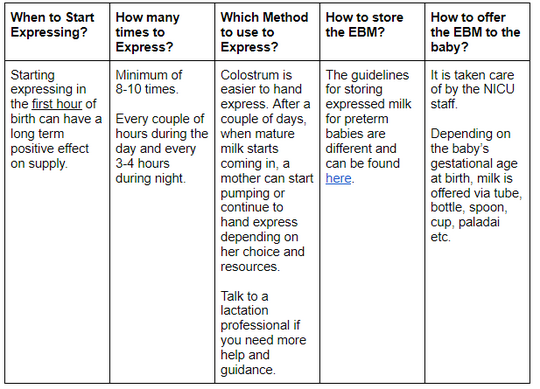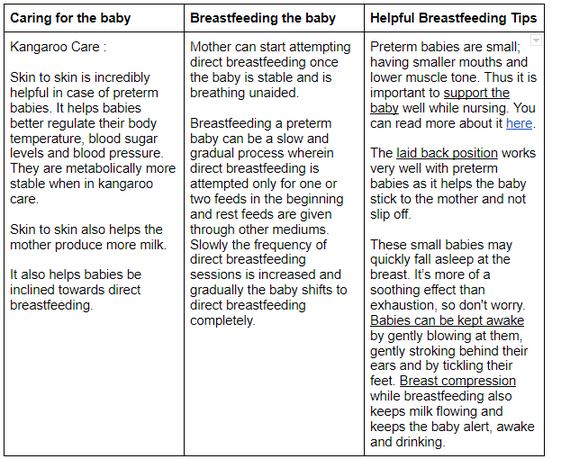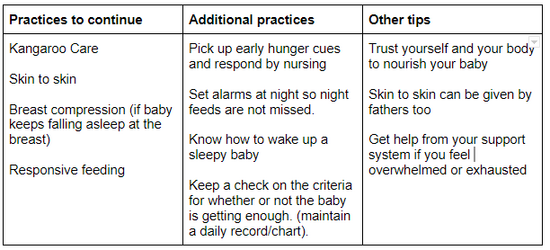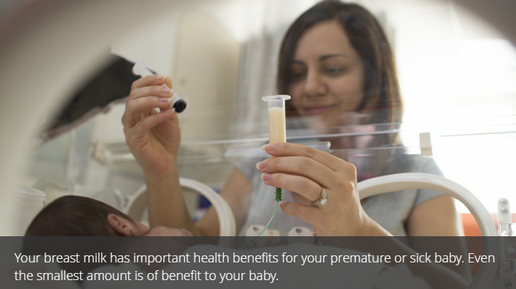My baby was born prematurely and was tube fed, how can I bring her to breasts?
Preterm is defined as babies born alive before 37 weeks of pregnancy are completed. Breastfeeding a baby who is born preterm can be challenging and difficult, but is attainable. We will focus on two parts of it.
- Before Birthing
- After Birthing
1. Before Birthing a preterm baby:
When a mother knows that she is going to birth a preterm baby, she can prepare beforehand. Antenatal expression of colostrum is a popular and useful method that is used in such cases. In this method, the mother can express colostrum and store it while pregnant under her medical caregiver’s guidance and advice. It is important to seek medical guidance as hand expressing colostrum during pregnancy can potentially bring early labour.
2. Upon Birthing a preterm Baay
Babies born before completing full term in the womb need extra care and are usually shifted to NICUs immediately after birth. The mother and the baby are often separated. Thus, it is important to express and send mother’s milk for the baby.
2a. When mother and baby are separated

2b. When mother and baby can occasionally or regularly be united at the medical facility


The Importance of Breastfeeding for a Preterm Baby :
- Breast milk is an alive, responsive food. It changes as per the baby’s needs. Thus, Milk that a mother will make for her preterm baby will be even more densely nutritious to help her baby strengthen and build her immunity and to provide the baby with the calories she needs to grow.
- Breast milk is easy to digest and even with her immature digestive system, a preterm baby will be able to absorb maximum nutrients from the breast milk.
- Breastfeeding can be a very important part of bonding with a small and fragile baby.
- Risks that come with the consumption of formula can be limited and/or avoided by breastfeeding.
- In the vulnerable population of preterm babies, breastfeeding contributes to decreased rates of late-onset sepsis, lower rates of metabolic syndrome, lower blood pressure and less insulin resistance as compared to babies given formula.
- Breastfeeding is related to fewer re-hospitalizations in the first year of life.
- Breastfeeding leads to improved neurodevelopmental outcomes
- Breastfeeding can lower parental anxiety.
Myths about Preterm Babies and Breastfeeding:
- Preterm babies below the gestational age of 34 weeks cannot latch. This is not always true. Some babies as small as 28 weeks of gestational age have successfully latched on to their mother’s breast and many babies of 32 weeks of gestational age have shifted to direct breastfeeding completely. However, each baby is different and must be seen and treated differently.
- All preterm babies must be given special ‘preterm infant formula’ for optimal growth. If the mother is able to express enough milk for the baby, it is the perfect food for the baby. (Perhaps additional vitamin supplements might be needed which can be prescribed by the paediatrician).
- Preterm babies, before they can latch, must learn to take bottles in order to learn how to suckle. This is not true. The mechanism and muscles used for bottle and breast are different and when a baby prefers bottles, it is difficult to get her back to the breast.
- Preterm babies get tired at the breast. Babies (not just preterm) find it soothing to breastfeed. In some cases, when the milk flow is slow, the baby tends to fall asleep. But that’s true for all babies. Preterm babies too can be kept awake at the breast by using breast compression during nursing and/or using a lactation aid (SNS)
References:
https://www.laleche.org.uk/successfully-breastfeeding-premature-baby/
https://www.canadianbreastfeedingfoundation.org/basics/premature_baby.shtml
https://www.who.int/news-room/fact-sheets/detail/preterm-birth
https://www.ncbi.nlm.nih.gov/pmc/articles/PMC3508468/
https://www.breastfeeding.asn.au/bf-info/premature
https://kellymom.com/ages/newborn/nb-challenges/preemie-links/

Wish to speak with a member of our team who is a certified lactation professional and also an experienced breastfeeding mother, click on this link.
Medical Advice Disclaimer
THIS WEBSITE DOES NOT PROVIDE MEDICAL ADVICE.
The information, including but not limited to, text, graphics, images and other material contained on this website are for informational purposes only. No material on this site is intended to be a substitute for professional medical advice, diagnosis or treatment. Always seek the advice of your physician or other qualified health care provider with any questions you may have regarding a medical condition or treatment before undertaking a new health care regimen, and never disregard professional medical advice or delay in seeking it because of something you have read on this website.
Disclaimer
We understand and acknowledge that parents and babies can be of various genders on a spectrum of LGBTQI+. Families come in diverse flavours. However, in our articles, for the sake of simplicity and convenience, we will be referring to the breastfeeding parent as the mother and using the female pronouns- ‘she’ and ‘her’ for babies. Babies can be nourished and nurtured in different ways and while we have used the terms breastfeeding and nursing, we recognize that parents can opt to chest feed or finger feed.
We don’t have conflicts of interest and declare, and we are compliant with the WHO code of marketing of breastmilk substitutes and the IMS act.
In case you find any information on this website that needs to be updated, please write to us at info@bsim.org.in






